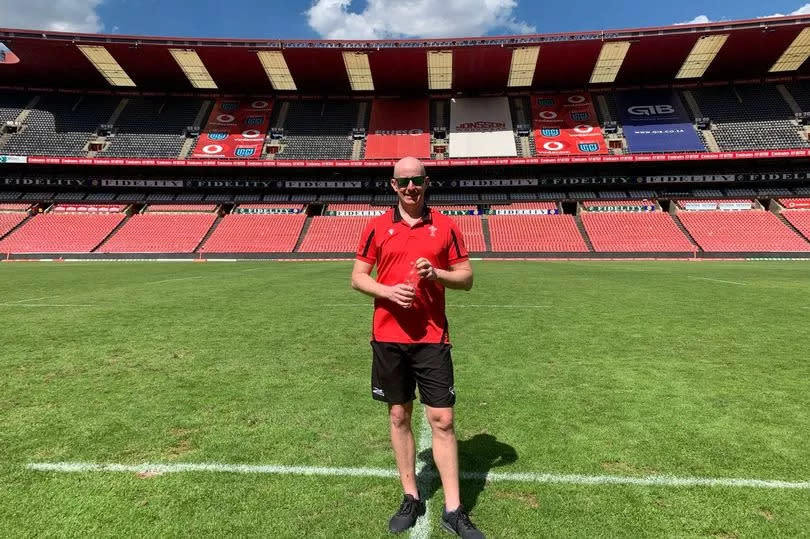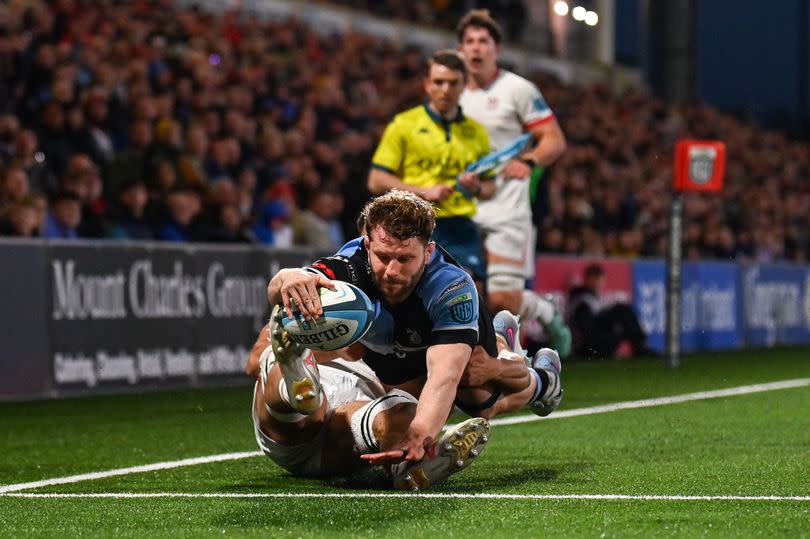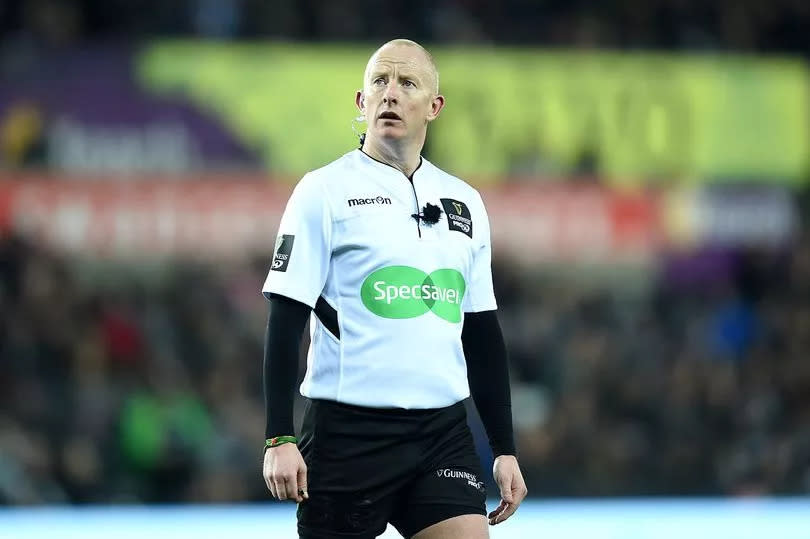The most powerful official in Wales speaks out on Ulster v Cardiff complaint and his plan to improve standards

The career of a rugby referee is never a straightforward one; often you are damned if you do and damned if you don't.
Safe to say it isn't for everyone, especially in the era of social media where every Tom, Dick and Harry claim to be an expert on rugby union's lawbook but for the select few it can be an extremely rewarding career. When Ian Davies broke his back playing for Bridgend Sports against Pontyclun as a 19-year-old more than 20 years ago, it proved to be the catalyst in kick-starting a successful career as a referee.
Fast forward 25 years, more than 80 United Rugby Championship games, 30 European fixtures along with a handful of internationals, Davies has been appointed the Welsh Rugby Union's National Elite Performance Manager. Davies is the most powerful match official in Wales, overseeing the elite end of officiating in the country while managing Welsh referees such as Ben Whitehouse, Craig Evans and Adam Jones.
SIGN UP: Get the new exclusive Inside Welsh rugby newsletter for full insight into what's really going on around all the big issues. This special offer will get you full access for the entire year for just £10 instead of £40.
When anyone thinks of rugby refereeing in Wales the likelihood is they still associate it with Nigel Owens, who was among the world's best for over a decade. But Davies believes Owens' successes has papered over the cracks in Wales and has highlighted the need to inspire more young men and women to take up the whistle.
"Nigel did paper over the cracks," Davies tells WalesOnline. "Aside from Nigel the last Welshman who refereed in the Rugby World Cup was Nigel Williams in 2003, so that's 21 years we've gone without representation.
"England had four in this year's World Cup, New Zealand had three and Australia had two. We clearly could have done things a lot better. You've got to look at yourself in the mirror sometimes before you can put things right.
"Nobody actively goes out thinking they want to be a referee so I think the challenge for us is to try to promote it. Refereeing opens up routes to see the world in a different light.
"In my new role I'll be looking after the pathway and the talent ID programme to identify where our next professional and elite referees are coming from. I think the challenge for me is the talent ID bit, understanding how people get into refereeing and the opportunities it brings.
"If you look at someone like Craig Evans, he was one of two brothers. Craig and his brother Ashley played for Wales U20s, scoring two tries in the 2013 Junior World Cup final in Nantes.
"While he went back to play some rugby in the Premiership his rugby career was pretty short at the top end, whereas Craig was the less abled player of the two brothers, and he'd readily admit that, but he's gone on to referee at the Olympic Games, Commonwealth Games and the Rugby World Cup.
"His CV is all encompassing from a refereeing point of view. For me it's just about opening peoples' eyes at a younger age when they are coming through the pathway or the regional age grade to understand that opportunities exist in the game which aren't just limited to playing."
Earning your trade as a rugby referee isn't necessarily an attractive proposition when one looks in from the outside. A recent documentary by RugbyPass highlighted the horrific abuse some match officials receive, with former world-class referee Wayne Barnes even receiving death threats at the recent Rugby World Cup in France.
Welsh rugby also has its own problems in the community game with a handful of players banned for abusing referees. So, how does Davies plan to make refereeing an attractive career pathway for young people in Wales?
"I think historically we've been really bad at letting people know what the pathway is to becoming a professional referee," said Davies. "If you came to me 10 years ago and said 'I want to start refereeing' then the first port of call would generally be a youth game.
"That's the area of the game where we get most issues, with testosterone-filled teenagers wanting to batter each other which often means the referee doesn't have a great experience. Do they come back after that? In a lot of instances, no.
"I think we need to change how we educate referees, and I don't mean that from a law perspective, I mean from the experience that we give to them. We need to try to fast track them if we see potential.
"I've got plans to put an academy of 10 referees together next season with a maximum age of 25 to give them exposure to the elite game in the new Elite Development Competition (EDC) and maybe on the touchline as a reserve match official in the URC.
"This would allow them to get exposure to what pro rugby is like, the pitfalls and the mistakes referees make. Through those pitfalls and the mistakes other referees make they'll probably learn a little bit quicker.
"I've met with many of the Premiership coaches over the last week or so and to be fair to them they've bought into it. They've given me a number of names in the regional age grade who they see as players but they also see them as referees and in some cases they think they are better referees than they are players.
"We've never been great at talent ID in Wales from a refereeing perspective. Where we have been it's probably at the latter end of players' careers.
"They approach 30 and decide to take up the whistle as opposed to seeing the opportunities that exist to travel the world at the age of 20. For me it's about broadening the horizons of people to see that opportunities exist.
"If you look at Ben Breakspear, he's off to Singapore on Monday to referee the sevens tournament there and he is going to the Olympic Games in July. As a child I think everyone want to go to the Olympics and see themselves running the 100 metres but not many people associate being a match official as part of it."

It's safe to say the United Rugby Championship is not overly popular with the Welsh rugby public, who often criticise the standard of refereeing. This week Cardiff filed an official complain to URC after a late try from Theo Cabango got chalked off by referee Mike Adamson last Friday night, who went on to award a penalty to Ulster because of an intentional knock on from Rhys Carre.
John Cooney nailed the penalty which gave Ulster a narrow 19-17 victory in Belfast. Cardiff were also unhappy the officials had missed a knock on from Cooney in the lead up to Ulster's only try, while Thomas Young was denied a penalty try after the ball was kicked from his grasp in the act of scoring.
So, what is the process after a complaint is filed and are there punishments for referees who don't perform to the required standard? "The URC will have a performance reviewer at each game," said Davies.

"For example, Wales has representation in the shape of Nigel Owens who sits as a performance reviewer with URC. Ireland did have Johnny Lacey, who has recently taken up a post with World Rugby, you've then got Tappe Henning who heads up that panel while there's also Andy Macpherson of Scotland and Marius Mitrea of Italy.
"There is a panel of people who review the performances of referees and they will collectively meet on a Wednesday night to discuss the decisions made by those officials and whether they were right or wrong. Yes, referees are held accountable, yes there's a process for reviewing performances and that's not just one person, that's a group of a number of officials sitting down on a Wednesday to review it.
"Ultimately an appointment is made based on performance and if a referee doesn't perform they don't get appointed for the big games. It's as simple as that.
"After each game the referee and both coaches will get the feedback from me within 48 hours. So, that should hit their desks by 5pm on a Monday, assuming it's a Saturday game. If there are any issues off the back of that then they can address it with myself and we will address it as a collective team of match officials in our Tuesday evening meetings.
"If there's any things we did well, any matters we didn't do so well or any discussion points surrounding the law. For example, our take on that Thomas Young incident.
"What was the collective view on that? The majority in the room thought it was a penalty try and I completely understand that but there are a handful of referees including myself who thought it was just play on because I don't think there was any intent on the player's part to kick that ball.
"Ultimately if we get a better collective understanding of each other's roles and better clarity then we should get a better product on the field."
Another allegation many Welsh fans throw at officials is whether there is bias towards Irish sides when they play at home. So, can the home crowd influence a referee and how do they prepare for a big match? "I genuinely think there probably is an influence and I'm not saying a referee is biased but sometimes they who shout loudest tend to get something," said Davies.
"That doesn't make it right but if someone draws your attention to something then you are more likely to give a decision. The balance of probability is the home crowd will turn your attention to something more than the away fans do.
"That's not being biased, it's just a fact of life. There is not one match official that I know who goes out to referee one side differently to the other.
"They all referee what they see in front of them but if someone draws someone's attention to something quicker or louder then they probably do get the balance of decisions in their favour. In terms of preparation at elite level in the URC, EPCR and World Rugby what happens is each referee will look ahead of the game and plan around what players are there, what pictures is he likely to see and how they are going to address these issues.
"For example, Cardiff's tighthead might scrummage at a slight angle so if we can address that issue on a Tuesday and we foresee it for the next Saturday then hopefully with the feedback back to coaches we can address it collectively so that doesn't happen.
"Lots of these issues can be addressed in the changing room beforehand by just chatting with players around trends they saw the week before." Davies is confident there are some excellent referees coming through the system in Wales and has made it his priority to improve the pathway.
"Ben Whitehouse is not only seen as a very good referee but probably the best TMO in the world," said Davies. "I think him going to the World Cup as a TMO has made him a better referee.
"The exposure Craig Evans had going to the World Cup, learning off others will have made him a better referee.
"Adam Jones is coming up and snapping at their heels, he has the makings of an excellent referee. We breed talent in Wales but it's about fine tuning them and refining their skills so they are sellable for want of a better phrase on a wider stage.
"We've got Shaun Connor's son, Ben, coming through and he's a fantastic prospect. I've coached him from an officiating perspective for the best part of three years.
"I think he will be our next prospect behind Ben Breakspear who is a bit more advanced at the moment. Ben is 20 and is refereeing in the Premiership at the moment.
"I'm hoping that he will go on the World Sevens series over the next few years and make the 2028 Olympics. Beyond that it's a talent ID issue in trying to identify who the next Ben Connor is going to be."

 Yahoo News
Yahoo News 
